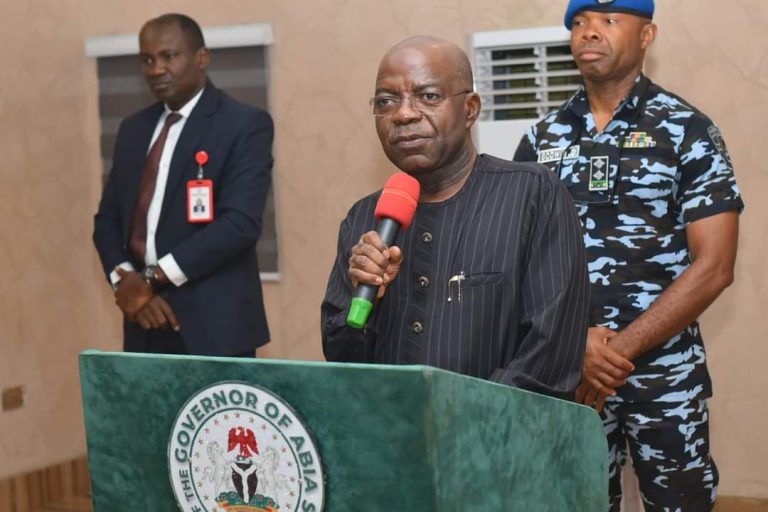
Governor Alex Otti of Abia State says his administration has paid full compensation to landowners affected by the Abia Airport project in Nsulu, Isiala Ngwa North Local Government Area, reaffirming his government’s commitment to transparency in infrastructure development.
Otti spoke at Okpuala-Ngwa on Saturday during a grand civic reception organized by stakeholders from Isiala Ngwa North and South. According to the News Agency of Nigeria (NAN), the governor said the compensation process was concluded before any construction began and assured that unresolved issues were mainly due to disputed ownership or inaccurate bank details.
“Before any construction began, we ensured that 100% compensation was paid to all landowners. If there is anyone yet to receive payment, it is likely due to issues like incorrect account details or disputes over ownership, not government negligence,” the governor was quoted as saying.
Register for Tekedia Mini-MBA edition 19 (Feb 9 – May 2, 2026).
Register for Tekedia AI in Business Masterclass.
Join Tekedia Capital Syndicate and co-invest in great global startups.
Register for Tekedia AI Lab.
The Abia Airport is designed to be more than just a landing strip. Otti says the government is transforming the site into a full-fledged “airport city,” complete with hotels, shopping plazas, a market, and a Nigerian Air Force base. The state government chose Nsulu based on expert assessments that identified the area’s central location and proximity to Umuahia and Aba as key advantages.
A Tale of Two Airports: The Ebonyi Example
However, the decision to embark on the project — which commenced in December 2024 — has faced sustained criticism from analysts, economists, and civil society actors. Many argue that what Abia urgently needs is investment in human development, basic infrastructure like roads and public schools, and a functional rail network to support trade and mobility across the Southeast.
“Governor Otti’s decision to prioritize an airport seems to contradict all the global developmental indices. Basic needs such as healthcare, education, and infrastructure should take precedence over such high capital ventures,” said Chiechefulam Ikebuiro, a social commentator.
Among the most frequently cited concerns is the cautionary tale of Ebonyi State, where an airport built by the David Umahi administration in Onueke, near Abakaliki, has struggled to attract regular commercial operations. Although commissioned in 2023, the airport has remained largely inactive. Observers say the sparse flight activity stems from the economic reality in Ebonyi — one of Nigeria’s poorest states — where the vast majority of residents cannot afford air travel.
Critics say Abia risks repeating the same mistake.
“The majority of Abia’s population comprises civil servants whose wages barely cover basic needs, let alone the luxury of air travel,” he added.
Abia State, before now, was the only South-East state without an airport. Enugu, Anambra, Ebonyi, and Imo all host airports — yet none have emerged as aviation powerhouses. The Akanu Ibiam International Airport in Enugu, the oldest in the region, still records low passenger traffic compared to airports in the South-West and North-Central zones. The airport in Imo State survives mainly on traffic from neighboring states, while Anambra International Cargo Airport, completed under Governor Willie Obiano, is yet to realize its commercial vision fully.
Otti, however, argues that Abia’s position as the commercial heartbeat of the region — with Aba as a key trading hub — gives the state a better chance at making the airport viable. He insists the facility will catalyze trade, tourism, and investment.
But What About Rail?
Many have noted that the South-East needs rail connectivity far more urgently than more airports. The region lacks a modern intra-regional rail system, making the movement of goods and people slow and expensive. Traders in Aba and Onitsha have long demanded freight rail access to Lagos ports, but those demands remain unmet.
“Before considering an airport, shouldn’t the government priorities essential infrastructure like good roads, healthcare facilities, schools, and maybe rail systems? These are projects that directly impact the daily lives of the hoi polloi,” Ikebuiro added.
Community Grievances Still Simmer
While the government insists on compliance with compensation procedures, tensions remain in parts of the host communities. In May 2025, leaders of the Umuezeukwu community in Isiala Ngwa North renewed calls for a 500-meter buffer zone between their homes and the airport site. They argued that previous pleas were ignored and that their ancestral lands were taken without proper relief or environmental safeguards.
According to community records, the original land acquisition for the airport was 1,850 hectares, later reduced to about 1,000 hectares following community pushback. However, Umuezeukwu claims it was excluded from the land concessions granted to other communities like Ikputu, Umule, and Umuode.
The governor’s Special Adviser on Land Matters, Okor Aji, dismissed the complaints, saying the land size was already scaled down after consultations. He emphasized that the project is legally grounded in the Land Use Act and that community interests were taken into account.
Access Bank has expressed interest in supporting the project, but no detailed breakdown of funding arrangements has been made public. Construction officially began in late 2024, with the government targeting December 2025 for completion of major access roads.



